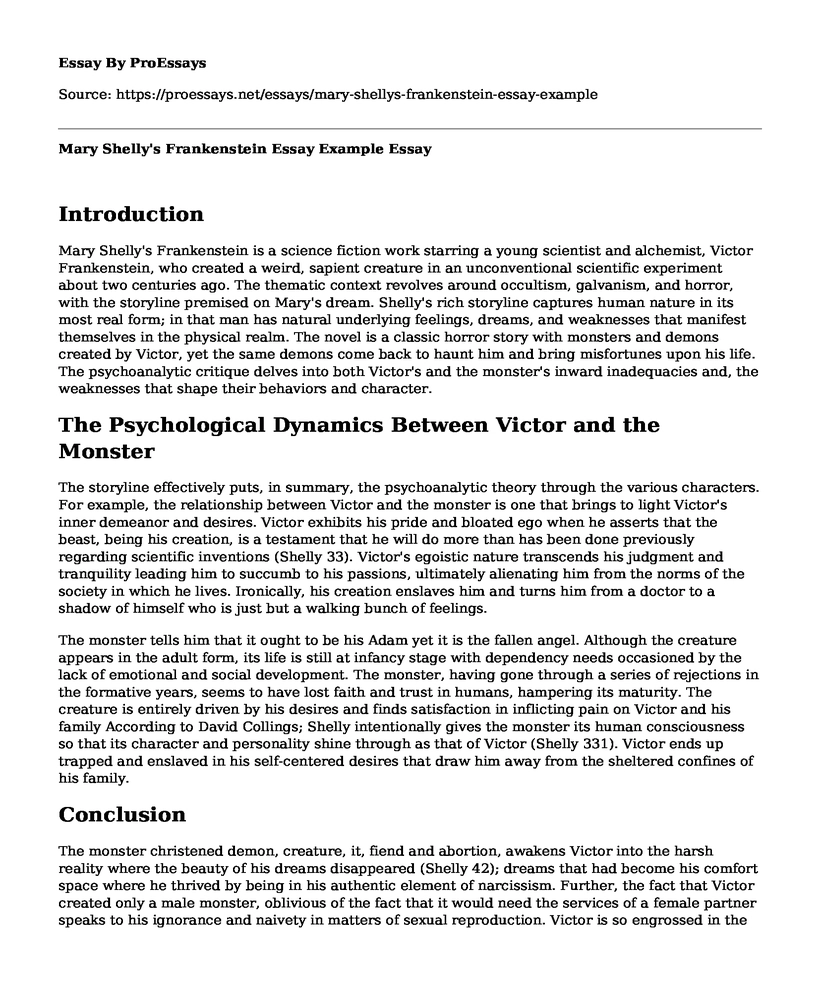Introduction
Mary Shelly's Frankenstein is a science fiction work starring a young scientist and alchemist, Victor Frankenstein, who created a weird, sapient creature in an unconventional scientific experiment about two centuries ago. The thematic context revolves around occultism, galvanism, and horror, with the storyline premised on Mary's dream. Shelly's rich storyline captures human nature in its most real form; in that man has natural underlying feelings, dreams, and weaknesses that manifest themselves in the physical realm. The novel is a classic horror story with monsters and demons created by Victor, yet the same demons come back to haunt him and bring misfortunes upon his life. The psychoanalytic critique delves into both Victor's and the monster's inward inadequacies and, the weaknesses that shape their behaviors and character.
The Psychological Dynamics Between Victor and the Monster
The storyline effectively puts, in summary, the psychoanalytic theory through the various characters. For example, the relationship between Victor and the monster is one that brings to light Victor's inner demeanor and desires. Victor exhibits his pride and bloated ego when he asserts that the beast, being his creation, is a testament that he will do more than has been done previously regarding scientific inventions (Shelly 33). Victor's egoistic nature transcends his judgment and tranquility leading him to succumb to his passions, ultimately alienating him from the norms of the society in which he lives. Ironically, his creation enslaves him and turns him from a doctor to a shadow of himself who is just but a walking bunch of feelings.
The monster tells him that it ought to be his Adam yet it is the fallen angel. Although the creature appears in the adult form, its life is still at infancy stage with dependency needs occasioned by the lack of emotional and social development. The monster, having gone through a series of rejections in the formative years, seems to have lost faith and trust in humans, hampering its maturity. The creature is entirely driven by his desires and finds satisfaction in inflicting pain on Victor and his family According to David Collings; Shelly intentionally gives the monster its human consciousness so that its character and personality shine through as that of Victor (Shelly 331). Victor ends up trapped and enslaved in his self-centered desires that draw him away from the sheltered confines of his family.
Conclusion
The monster christened demon, creature, it, fiend and abortion, awakens Victor into the harsh reality where the beauty of his dreams disappeared (Shelly 42); dreams that had become his comfort space where he thrived by being in his authentic element of narcissism. Further, the fact that Victor created only a male monster, oblivious of the fact that it would need the services of a female partner speaks to his ignorance and naivety in matters of sexual reproduction. Victor is so engrossed in the in unnatural scientific creation that he takes no cognizance of the need to father a child with Elizabeth. Instead, he goes on to make one using available instruments around him that he intends to infuse life into (Shelly 42). Frankenstein is full of impulses and a guilt complex occasioned by past behavior. He is aware that the impulses are potentially harmful, but he pursues them nevertheless. He pursues the monster to revenge oblivious of the danger ahead, as he seemingly goes towards death in a bid to honor the dead; his family and friends who were murdered by the monster he created.
Works Cited
Shelly, M. (2017). Frankenstein.
Cite this page
Mary Shelly's Frankenstein Essay Example. (2022, Oct 03). Retrieved from https://proessays.net/essays/mary-shellys-frankenstein-essay-example
If you are the original author of this essay and no longer wish to have it published on the ProEssays website, please click below to request its removal:
- Literary Analysis of Harper Lee's Work Paper Example
- Literary Analysis Essay on Alice Adventure in Wonderland
- Essay Sample on Lessons in Stranger in the Village & Learning to Read and Write
- Essay on Universal Themes and Characters in Death of a Salesman
- Essay Example on Elisenda's Sigh of Relief: Genuine or Selfish?
- Essay Example on Trifle: A Play Divided by Gender, Investigating a Murder
- Essay Sample on Myths of Ancient Greece: Gender Roles & Stereotypes







